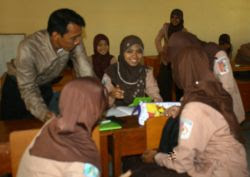Do you understand what expressions are commonly used in sharing opinions? Well, in this material, we are going to learn some of the most common English expressions used in giving, asking, agreeing, and disagreeing with an opinion.
What's in this post?
I. Asking and giving opinions
| Asking about Opinions | Giving Opinions |
|---|---|
| What do you think of ...? | I think / feel (that) .... |
| What is your opinion on/about ...? | I strongly believe (that) .... |
| How do you feel about ...? | Well, as far as I’m concerned .... |
| What are your feelings about ...? | I’m convinced / sure / positive that .... |
| What do you like from ...? | In my opinion .... |
| Tell me what you think of .... | It seems to me that .... |
| How do you like ...? | Well, to my mind .... |
| What’s your idea about ...? | In my point of view, .... |
| Why do you say that? | Well, if you ask me, .... |
| Do you agree with / that ...? | I have no doubt that .... |
II. Agreeing and disagreeing with opinions
| Agreeing | Disagreeing |
|---|---|
| Exactly / certainly. | I disagree / don’t agree (with you). |
| I think / suppose so. | I see your point, but .... |
| I agree (with you). | Do you think so? |
| You’re (absolutely) right. | I don’t think / suppose so. |
| That’s true. | You must be mistaken. |
| That’s exactly what I think. | Oh, surely not. It's not the same thing at all. |
| I’m with you. | It’s not right. / It’s wrong. |
| I'm on your side. | Yes, but on the other hand, .... |
| I'll give you that. | As for me, I would rather .... |
| I can’t / couldn’t agree more. | We must agree to disagree. |
III. Sample dialogues about asking and giving opinions
A. Dialogue 1: Talking about a talented person
| Rena: | Did you see Ali's performance last night? |
| Udin: | Yes, I did. What do you think of it? |
| Rena: | It was fabulous! I never thought he has such a great talent in music. |
| Udin: | I agree with you. It was one his best performance. |
| Rena: | I'm sure that if he keeps practicing and practicing, he will be a great musician some day. |
| Udin: | That's exactly what I think, Rena. |
B. Dialogue 2: Talking about health
| Santi: | Have you heard the news? The government has urged members of the public to wear a mask to prevent Covid-19 infection. |
| Julia: | Yes, I've heard about that. What's your opinion? Should we really wear a mask? |
| Santi: | Well, there are controversies about it. But, I would rather wear one than wear nothing. |
| Julia: | Well, let's think about it. I'm sure that if everyone starts wearing masks it will create a shortage of masks for health care workers who need masks more desperately than we do. |
| Santi: | I see your point, but we don't have to wear a clinical mask, do we? We can wear a cloth mask for protection, instead. |
| Julia: | I agree with you on this. Clinical masks should be worn only when someone has flu or cough, or they are exposed directly to sick persons. |
| Santi: | That's what I wear when I go out. Cloth mask will do for protection. |
| Julia: | By the way, I have another question. Do you think wearing a mask is really effective in protecting us from Covid-19 infection? |
| Santi: | Well, that's still debatable. As for me, wearing a protection is much better and safer than wearing nothing at all, especially in the midst of this outbreak. |
C. Dialogue 3: Talking about clothes
| Raisa: | What do you think I should wear to Dea's birthday party? |
| Ima: | In my opinion, any dress will do. I know you have quite a lot of party dresses. |
| Raisa: | Yes, but I don't want to be seen wearing the same dress in a party. |
| Ima: | I see, but Dea and her friends have never seen all of your dresses, right? |
| Raisa: | You're right. Then, I'll wear the green dress that I wore in my cousin's engagement party. |
| Ima: | That'll be fine. I don't think you can afford buying a new dress every time you are invited to a party. |
| Raisa: | That's true, Ima. |
A. Do you know what these sentences imply?
The sentences below are taken from the sample dialogues above. Identify their meaning by choosing the correct options; A, B, C, or D.- What do you think of it?
- Asking for an opinion
- Giving an opinion
- Agreeing with an opinion
- Disagreeing with an opinion
- I agree with you. It was one his best performance.
- Asking for an opinion
- Giving an opinion
- Agreeing with an opinion
- Disagreeing with an opinion
- I'm sure that if he keeps practicing and practicing, he will be a great musician some day.
- Asking for an opinion
- Giving an opinion
- Agreeing with an opinion
- Disagreeing with an opinion
- That's exactly what I think.
- Asking for an opinion
- Giving an opinion
- Agreeing with an opinion
- Disagreeing with an opinion
- What's your opinion? Should we really wear a mask?
- Asking for an opinion
- Giving an opinion
- Agreeing with an opinion
- Disagreeing with an opinion
- But personally, I would rather wear one than wear nothing.
- Asking for an opinion
- Giving an opinion
- Agreeing with an opinion
- Disagreeing with an opinion
- I see your point, but we don't have to wear a clinical mask, do we?
- Asking for an opinion
- Giving an opinion
- Agreeing with an opinion
- Disagreeing with an opinion
- As for me, wearing a protection is much better and safer than wearing nothing at all, especially in the midst of this outbreak.
- Asking for an opinion
- Giving an opinion
- Agreeing with an opinion
- Disagreeing with an opinion
- What do you think I should wear to Dea's birthday party?
- Asking for an opinion
- Giving an opinion
- Agreeing with an opinion
- Disagreeing with an opinion
- I see, but Dea and her friends have never seen all of your dresses, right?
- Asking for an opinion
- Giving an opinion
- Agreeing with an opinion
- Disagreeing with an opinion
B. Complete these dialogues.
Complete the dialogues below by filling each blank underlined space with the best phrase or sentence on the right.| Yana: | ...(1)... about Indonesian movies? | In my opinion |
| Maya: | ...(2)..., some of them are good, but some are not worth-seeing. | I see |
| Yana: | ...(3)...? | What do you mean |
| Maya: | Some films are made seriously by reputable and experienced producers, while some are made just to be a flash in the pan. | What do you think |
| Yana: | ...(4).... What kind of films do you like? | |
| Maya: | Thrillers and dramas. I like the film that bases its story line on common people's every day life, yet emotionally capturing or thrilling. |
| Cita: | Look! Our school walls have been repainted. It looks fresh now. ...(5)...? | We must agree to disagree |
| Rika: | ...(6)... that the old color is nicer. | I disagree with you |
| Cita: | Are you kidding? The newly painted wall and the flowers look wonderful together. | What do you think |
| Rika: | ...(7).... To me, it’s the worst color combination our school has ever had. | It seems to me |
| Cita: | ...(8)... this time. |
| Nadia: | Dina, that's a red rose, isn't it? | I can't agree more |
| Dina: | Yes, it is. And look at that yellow one. Isn't that magnificent? | as for me |
| Nadia: | Well, ...(9)..., I would rather have the red one. I'm not really keen on yellow roses. Do you have a garden, Dina? | |
| Dina: | Yes, I do. It's small, but it's fun to take care of flowers in our spare time. | |
| Nadia: | ...(10).... Flowers can be very refreshing. |
C. What is your opinion on these issues?
Do you agree with the following issues, or do you disagree? Write your opinion and reason(s).- Members of the public must wear masks in order to prevent and stop the spread of Covid-19.
- Strict lockdown such as in India should be applied to stop the spread of Covid-19.
- Clinical masks should be worn only by health workers and sick people.
- People always want something more or something different, and are never satisfied with what they have.
- Students should not bring mobile phones to school.
- National Test (UN) is important as a benchmark of national education.
- Students playing Tik-Tok during school hours must be punished.
- Social media profiles should be considered in new workers recruitment.
- School education must be free of charge.
- School uniform should be deleted.
Questions? Just drop a few lines in the comment section below.
For another example of a dialogue about feelings and opinions, just click the link below.






